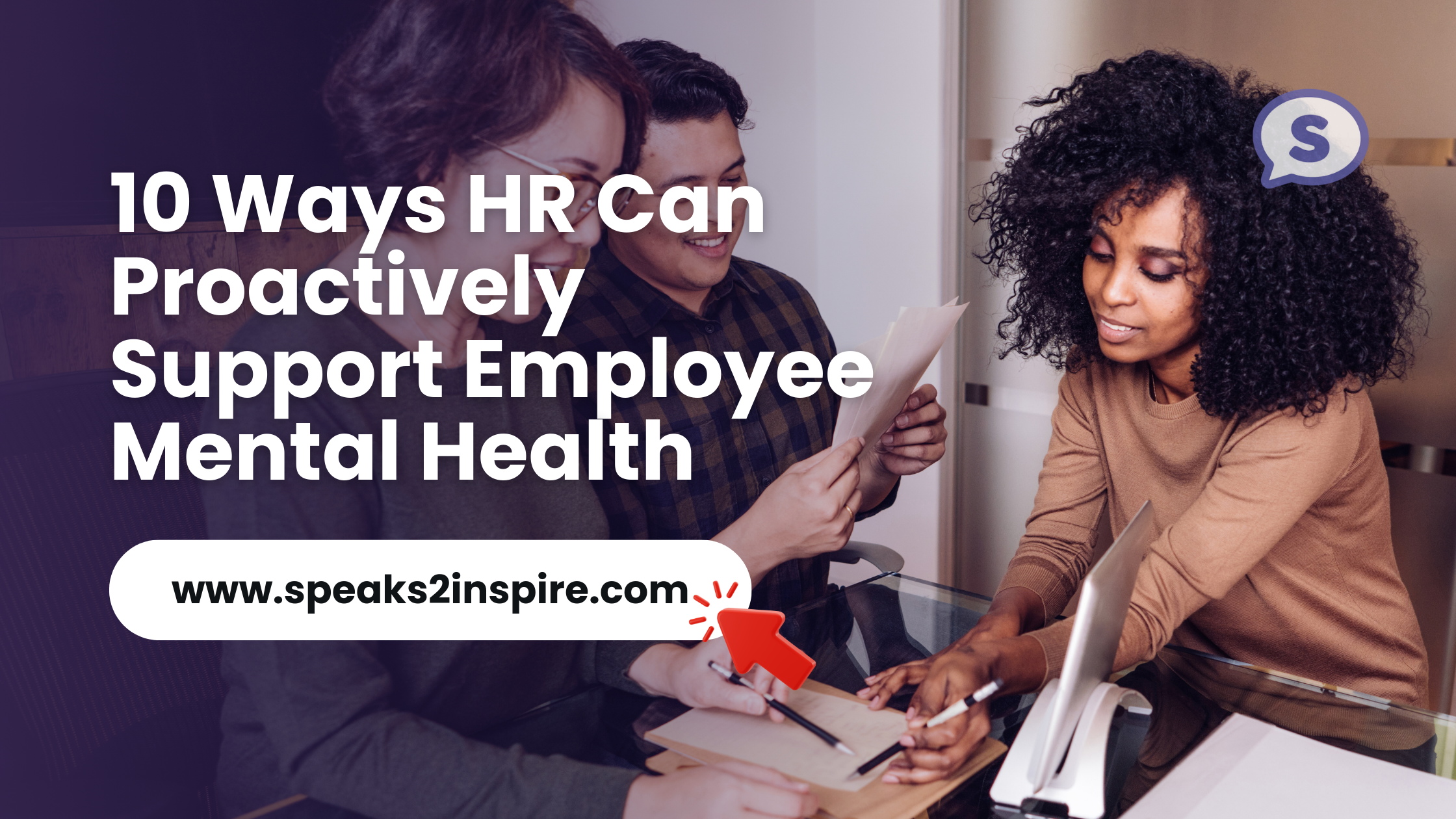In a bustling office in downtown Chicago, Jena, an HR manager with a decade of experience, is multitasking between employee engagement surveys and a performance review cycle. She notices a pattern emerging from the surveys—more employees indicated stress, burnout, and a need for better mental health support. Jena, always a proactive problem-solver, recognizes that addressing mental health concerns may be a necessity in her organization.
Jena’s situation isn’t unique. Across industries, HR professionals are becoming increasingly aware of the critical role they play in fostering a healthy workplace environment. Mental health issues can lead to decreased productivity, increased absenteeism, and high turnover rates. So, what can HR leaders like Jena do to be more proactive? Here are ten effective strategies to consider:
 Healthcare and school professionals attend a Speaks 2 Inspire Wellness Training to gain practical tools to decrease stress, build resilience, and cope with high workloads.
Healthcare and school professionals attend a Speaks 2 Inspire Wellness Training to gain practical tools to decrease stress, build resilience, and cope with high workloads.
1. Create a Safe and Open Environment for Conversations
The first step in supporting employee mental health is creating a culture where they feel safe discussing their challenges. You may implement regular ‘mental health check-in’ sessions, led by a trained peer facilitator or mental health professional, where employees could talk openly about their concerns in a confidential setting. These sessions can reduce stigma and promote belonging.
2. Offer Comprehensive Mental Health Benefits
This might include access to therapy, counseling sessions, on-demand wellness education, mental health days, and wellness apps. Consider tech-enabled wellness initiatives like FRANSiS, which utilizes text messaging and Ecological Momentary Interventions (EMIs) to deliver personalized, positive messages to users throughout the day.
3. Implement Regular Workplace Mental Health Training
Regular training sessions on mental health awareness and life-skill development can equip employees and managers with the tools they need to support each other. Monthly workshops may cover topics like recognizing signs of stress, practicing self-care, and how to approach a colleague who might be struggling.
4. Promote Work-Life Balance
HR can play a role in promoting policies that encourage healthy work-life balance. Trusting your team to manage their time and responsibilities by offering flexible working hours, PTO, or remote work options, can increase employee satisfaction and productivity.
5. Develop a Clear Mental Health Policy
A written mental health policy provides a clear framework for how the company will support employees. This policy should outline the company’s commitment to mental health, the resources available, and the procedures for employees to seek help.
6. Establish an Employee Assistance Program (EAP)
EAPs provide employees with access to confidential counseling and support services. Marketing local and national lifelines also promotes employee awareness about mental health resources and encourages help-seeking behaviors outside the workplace.
7. Encourage Physical Wellness
Physical health is closely linked to mental health, and promoting physical wellness can have a positive impact on employees’ mental well-being. These activities can provide employees with opportunities to relieve stress and connect with colleagues, promoting physical and mental well-being.
8. Recognize and Address Workplace Stressors
Workplace stressors like heavy workloads, unrealistic deadlines, and poor communication can significantly impact mental health. HR professionals should regularly assess the workplace environment to identify and address these stressors and employee needs.
9. Train Managers to Support Employee Wellness
Managers play a crucial role in supporting their team’s mental health. Consider organizing training sessions for managers to increase mental health literacy, recognize signs of distress, and learn how to provide support. These training sessions will empower managers to create a more supportive work environment and respond effectively to employees who might be struggling.
10. Lead by Example
Finally, HR leaders should lead by example. Your transparency encourages others to prioritize their mental health and seek support when necessary. By leading by example, you can foster a culture of authenticity and care.
Creating a Workplace Culture of Mental Wellness
By prioritizing mental health, you can enhance the well-being of your employees and also contribute to a more engaged and productive workforce. You have the power to make a significant impact on employee wellness by implementing these strategies.
Like you, we understand the importance of supporting mental health in the workplace. Speaks 2 Inspire specializes in providing interactive learning experiences to help organizations like yours create a mentally healthy work environment. Contact us today to learn more about how we can support your organization and sign up for our newsletter here.
Together, we can build a culture where employees feel valued, supported, and empowered to bring their best selves to work daily.
About Speaks 2 Inspire:
At Speaks 2 Inspire, we’re committed to eradicating mental health stigma and empowering individuals and organizations to prioritize mental well-being. With years of experience in planning and hosting engaging mental health and wellness training, we understand the challenges and opportunities involved in creating meaningful experiences that drive positive change.
Get Started Today:
Ready to make a difference in your community? Download the Mental Health Event Planning Guide now and embark on your journey toward creating impactful events that inspire, educate, and empower.
[Download the Mental Health Event Planning Guide]
Together, we can make a difference.
Was this post valuable? Share it on your social media platform!





